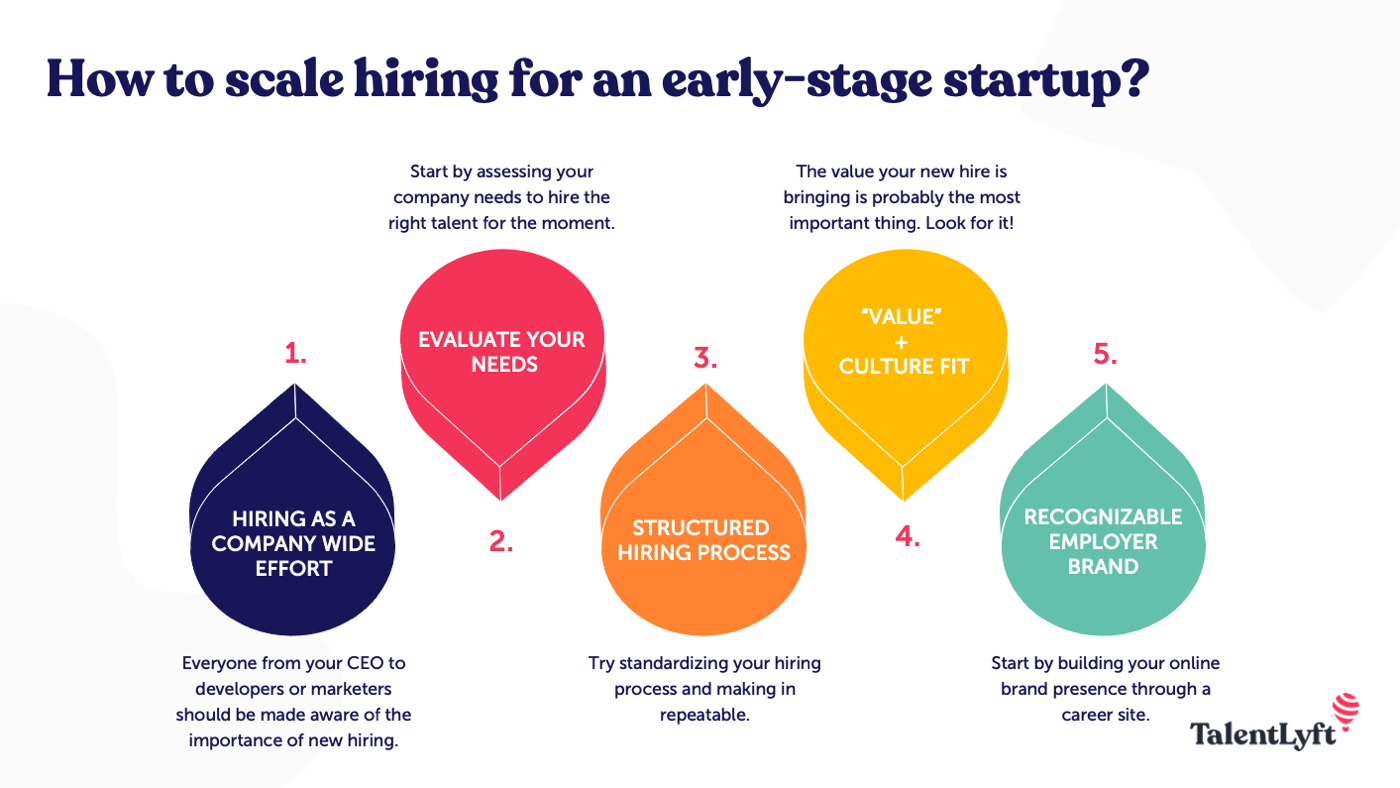How to Scale Hiring for an Early-Stage Startup?
There is no secret that working in a startup is as turbulent as in no other working environment. While it requires a complete focus and dedication from its employees for a company to experience expansion, in startups, there is always a pretty good chance of everything going south in a short period. The good news is that, just like things can almost always go downwards, startups can equally experience doubled workload and the need for extensive hiring over the night with new investment.
But, hiring great talent represents a challenge even for bigger and established companies, which often allocate significant budgets and spend a lot of time building a strong employer brand. So, you can only imagine how it must be for startups to enter the competition for winning over talent without often having a dedicated HR professional in the first place.
![https://adoptostaging.blob.core.windows.net/article/7IRYJUOpTkKD-Jk7xc7Srg.png]()
Hiring As a Company-Wide Priority
For a startup with around a dozen employees, hiring an HR Manager is probably a waste of resources. Even when the company raises investment money and plans to expand the team - sometimes even double it, having a dedicated HR Manager working full-time can still be unnecessary. This shows how hiring is definitely not a standardized procedure but more of a company effort when the surge comes in! More specifically, the CEO often dig up that hidden talent and align their needs and wishes with its prospects.
Whoever in the company takes the primary responsibility for this challenge, one thing remains essential in all cases - and that is that hiring should become a company-wide effort with the initiative coming from the top. This means that while your CEO could be using their network to spread the word and negotiate with the candidates, the rest of the company can engage in other supporting activities. Things like building up social media and online presence with an improved career site, writing job descriptions, or even reaching out to their network to attract potential candidates are all things that other employees can do to help. Everyone from the company can be a valuable resource of contacts, especially in the field in which they work.
Since most startup CEOs or basically anyone working for a startup are probably nodding their heads in confirmation as they read these words, we decided to give you some practical steps to scale up hiring at a startup when a significant investment arrives.
Evaluate Your Company Needs
First and foremost, going into a hiring spree requires a lot of planning and well-thought-out business decisions. For example, let's say you are a startup with 10 employees, and after a recent investment, you are about to double your team to 20 members. Who are these new employees going to be, and which jobs will they be performing?
For a company often, with such drastic expansion on the way, we believe you could use a helping hand in any department. But instead of fulfilling your lifelong dreams of having an in-house designer - for instance, the focus should remain on which aspects will deliver more company growth at this moment. That's why creating a planned-out strategy with measurable objectives and performance indicators will be a way to start your transition. For anyone familiar with the OKR framework, setting up the highest priority Objective to hire 10 experts should be followed with key results of developing a sustainable growth strategy and finding and hiring relevant talent.
Create a More Structured Process
Once you know what the spread of talent will look like and how many professionals you need for which department to achieve your business targets, it's time to standardize the hiring process. Even though we've mentioned above that hiring becomes a company-wide policy with almost anyone from developers, marketers, and the CEO taking on the role of a recruiter, it's still important to find common ground on which skills need to be assessed for which position. Besides providing a less chaotic experience to your candidates, which will probably result in increased satisfaction with the process for them, you will make sure to continually assess the right attributes without getting caught up with your own chaos.
So, besides creating a standardized process and predefining all stages, it is essential to develop an assessment process to assess the skills you'll need from your future employees. This planned-out and more strategic approach to scaling your talent will bring you short-term benefits of creating a faster hiring process and long-term benefits related to hiring an adequate workforce.

Value Is As Important As the Culture Fit
When creating your assessments and determining which skills and personality traits you are looking for in a new hire, you should definitely consider the value your new hire is bringing. Of course, this means that pointing out the culture they are entering, especially in a fast-paced, demanding startup environment, remains essential. Still, the knowledge and skills the candidate can bring to the table are equally important.
More specifically, for a startup being in a dynamic environment, finding talent that suits those frequent changes and ready to take on challenges that might be completely new and sometimes unplanned might reflect what you need in a person. For a startup, it is often the case that employees have to figure things out for themself without some structured guidance and mentorship. And this means hard work. Since it is difficult to evaluate such skills in a candidate, try creating a specific situational assignment testing their possibilities to adapt or examining their practical knowledge. Whatever the solution may be for you, never neglect the power of a good assessment and always focus on your candidate's value to the company.
The point of value is significant in the startup environment where each employee brings so much to the organization's well-being ( or wrongdoing), and it's up to you to find the best way to assess it!
Work on Your Employer Brand
As a young company investing the majority of its resources in progress, you might be completely neglecting the idea of building a recognizable employer brand for your company. However, once you start hiring more extensively and experience the struggle that comes with finding and hiring the perfect fit for your company, you instantly wish you started working on your employer branding from day one.
And, when we say "building a recognizable employer brand" in a startup, we don't mean hiring a dedicated person for such efforts or even necessarily building an entire comprehensive strategy around your employer brand. But what we are saying is that you need a career page communicating what you stand for as a company and making you stand out with a little bit of branding. This way, even the smallest companies can quickly fight in the war for talent with some industry giants.
Nowadays, candidates search for the legitimacy of their future employer online. Before even applying for the job, they are interested to read about what they could expect from working at the company. Since showcasing such information has become a standard for companies of all sizes, you could be losing a lot of valuable talent without it. The good news is that building your own branded career site with customizable landing pages and engagement features doesn't have to be expensive or complicated.
All startups get a discount for the first three years of using TalentLyft!
With our tool, you can build your own branded customizable career site for special prices tailored to help startups get on their feet.
Get started! Road to Building a Team of High Performers
Let's face it, we all want motivated high performers to be on our team and not out there killing it for our competitors. And for startups scaling for growth, it can be sometimes tricky to attract such talent over the night. However, setting up hiring to be a company-wide priority and adjusting your processes, along with starting to build a recognizable online and offline employer brand, you can come a long way. So, keep the focus on the essential things as you'll soon be on the road to building a team of high performers!








![Boolean Search for Recruiters [Actionable Guide]](https://adoptoprod.blob.core.windows.net/article/7wyu_xAg806Tm_lmFg71Rw.png)








